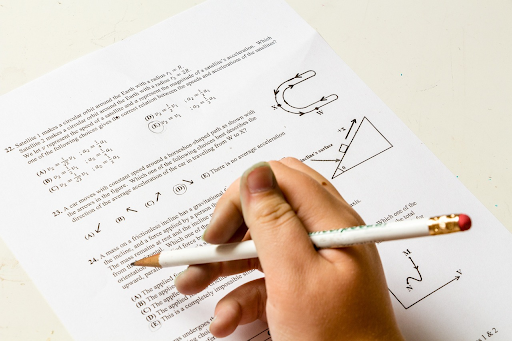One teacher. Thirty students. Thirty desks all lined up in a perfect grid pattern. Some kids will go into this room knowing that this test could very well determine their future and their life as a whole. Others will go into this test with no conception of how important this single test will be. This is what millions of teenagers will see in the early morning of February 24, 2024.
The SAT. Nobody’s favorite test.
Now that the College Board has decided that the SAT will be condensed into just two sections instead of four sections, and has also made one of the most important and arguably one of the most controversial changes to the SAT in years. The SAT will be digital starting 2024.
Major newspapers such as The New York Times, LA Times, US World Report, The Associated Press, and more have been covering this story since 2021. Now that this year’s Juniors and Seniors will be taking this on a computer, students now have to re-examine the test as a whole and ask the question:
Is the SAT necessary?
It is widely accepted that the SAT makes up for a good portion of how someone could get into a college; however as of late, more and more colleges have started to make the SAT an optional part of their admissions process. This “SAT-optional” rhetoric is only displayed at a select few colleges such as the University of California college system. However, this rhetoric hasn’t been shared by prestigious colleges such as MIT and Ivy League schools where they have decided to reimplement their test mandate following the end of the pandemic.
Such a drastic division from some of the most prestigious colleges and universities to the average college on the issue of the SAT and its place in admissions displays the blatant disconnect between prestigious colleges, average colleges, and high schools across the country. I spoke with Hunter Tocci, a senior at Pentucket. He agrees with the importance of the SAT and he says, “The SAT is a good calculator of mental aptitude and it makes a lot of sense that higher prestige schools still require it.”
Hunter isn’t alone in this viewpoint.
Mr. Siegfried, a history teacher here at Pentucket, talks in my interview with him about when his daughters went into college. He says that overallSAT did not make too much of an impact on the decision if they got in or not.
Emily Gleason offered a different opinion. When asked about how she feels about the SAT, she said,“It’s very outdated, it is racist in origin, and it doesn’t give a holistic view on a student’s performance. ”
Psychological Impact
As a student who is prospective of taking the SAT, I am worried about potential short-comings with the SAT not being as prevalent as it was two decades ago. I’m not alone in this philosophy and for good measure.
A study by American University in 2020 shows the pitfalls of the SAT and also how the SAT can be detrimental to both students and teachers. Some of the points included in this study are:
“
- By placing emphasis on reading, writing, and mathematics, standardized tests have devalued instruction in areas such as the arts, history, and electives.
- Standardized tests are thought to be fair because every student takes the same test and evaluations are largely objective, but a one-size-fits-all approach to testing is arguably biased because it fails to account for variables such as language deficiencies, learning disabilities, difficult home lives, or varying knowledge of US cultural conventions.
”
Not only does the SAT put pressure on students and teachers, it makes for an unhealthy climate in schools. These schools feel pressured to make the curriculum entirely focused on preparing students for such a standardized test.
Director of Curriculum for Pentucket grades 7-12, Mr. Conant said, “[Students with two parents] who went to college have a higher chance to succeed due to the experiences their parents had.”
He continues, saying, a curriculum centered around test preparation isn’t learning. This is one large test prep class, not a school. Secondary schools shouldn’t be teaching to prepare students for a standardized test, these schools should be teaching to prepare students for the real world as not every person is still going to want to go to college.
This curriculum does not only create ill-prepared students, it creates an environment where students have to study for tests much more frequently than in a normal school curriculum. To fully grasp the issues that students faced, I talked to one of the school’s guidance counselors, Ms. Howard.
I asked her about the weight of the SAT and the mental strain of preparing for it, and she responded, “With not as much pressure being put on the SAT with the SAT-optional schools, more and more people are being pressured into getting better GPAs to form a more competitive portfolio for their college resume.”
If high school counselors are displaying such an awareness towards the competitiveness of college admissions and saying that many people are seeking help from them due to the mental strain it puts on high school students.
Conclusion
As with many things, the SAT isn’t perfect and as such it has its flaws; however, in my personal opinion the SAT is a vital piece for college admissions across the country to understand what their potential student would be like.
A list of schools that are test-optional are found below:
Northeast – Private
- Amherst College
- Babson College
- Bates College
- Carleton College
- Carnegie Mellon University
- Claremont McKenna College
- Colby College
- Davidson College
- Duke University
- Emory University
- Hamilton College
- Haverford College
- Middlebury College
- New York University
- Northeastern University
- Northwestern University
- Rice University
- Skidmore College
- Swarthmore College
- The Cooper Union
- Tufts University
- Vassar College
- Wellesley College
- Williams College
Northeast – Public
- Rutgers University
- SUNY Binghamton
- University of Connecticut
- University of Maine
- University of Massachusetts Amherst
- University of Vermont
Midwest – Private
- Grinnell College
- Kenyon College
- Macalester College
- Notre Dame University
- Oberlin College
- Wesleyan University
Midwest – Public
- Michigan State University
- Ohio State University
- Purdue University
- University of Illinois Urbana-Champaign
- University of Michigan, Ann Arbor
- University of Minnesota
- University of Wisconsin
South – Private
- Clemson University
- Scripps College
- Trinity University
- Vanderbilt University
- Villanova University
- Wake Forest University
- William & Mary
South – Public
- North Carolina State University
- Texas A&M University
- University of Maryland
- University of North Carolina at Chapel Hill
- University of Pittsburgh
- University of Richmond
- University of Southern California
- University of Texas – Austin
- University of Virginia
- Virginia Tech
West – Private
- Claremont McKenna College
- Harvey Mudd College
- Pomona College
- The Cooper Union
- Wellesley College
West – Public
- Brigham Young University
- Colorado School of Mines
- Santa Clara University
- University of California, Berkeley
- University of Washington




















Sean Mitchell • Jan 22, 2024 at 11:05 am
I really liked your whole article about the SAT. It really made me open my eyes to the truth and reality of the test. I liked how you gave proper info about colleges making the test optional and how some are not. I like how you talked about the mental health aspect of it and how it affects kids negatively by putting stress on them. I liked how you were not one-sided and gave information from both sides with examples of why it’s good and bad. You were very informative about the SAT. Good job!
Jackson Beauparlant • Jan 18, 2024 at 6:44 pm
I think you have a very solid view on the SAT and I can appreciate all the feedback from students and teachers. At the end of the day, I agree that the SAT id becoming outdated for college admissions. as fewer and fewer admissions offices don’t force it on them. but this also begs the question of what will happen to other major foreign exams like the Indian JEE exam and the Gaokao exam in China. which are seen as 10X harder than the SAT exam. I am interested to see what this could lead to in the future for exams like the SAT.
Aaron • Jan 9, 2024 at 3:21 pm
Zach,
I like how you broke down the significance of the SAT. I do agree that the SAT puts pressure on students and can create an unhealthy environment for schools. I like how you interviewed a student and a teacher on how the SAT affects them mentally, and how it may affect a student going into college. I also liked how you included schools that are test-optional at the end of the article.